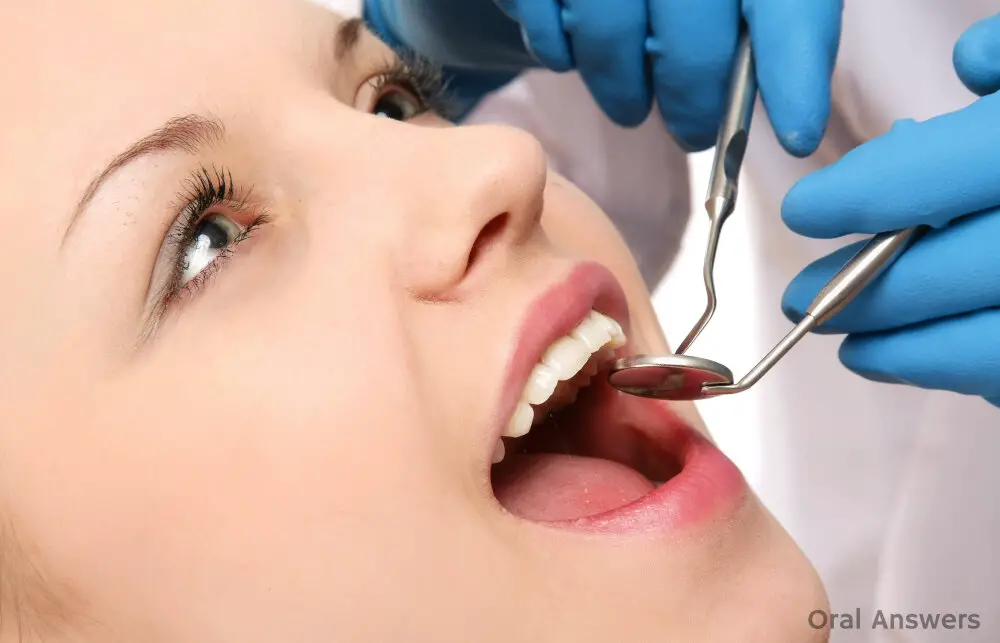How Long Does It Take for Wisdom Teeth to Grow In? Explained by Dental Experts

Wisdom teeth are often considered a rite of passage for teenagers and young adults. These third molars typically begin to emerge between the ages of 17 and 25, but the exact timing can vary from person to person. Some people may never develop wisdom teeth at all, while others may experience discomfort and complications when they do come in. Understanding the process of wisdom tooth growth can help demystify this common dental issue and prepare individuals for the potential challenges that may arise. According to dental experts, the length of time it takes for wisdom teeth to grow in can vary widely depending on a number of factors. Genetics, diet, and overall health can all play a role in the timing and development of these molars. In general, however, most people can expect their wisdom teeth to start emerging between the ages of 17 and 25. The process typically begins with the roots of the teeth forming deep within the jawbone, followed by the actual eruption of the teeth through the gums. While some individuals may experience little to no discomfort during this process, others may need to seek dental intervention to manage pain or complications.
Wisdom teeth are the third and final set of molars that typically grow in the back of the mouth between the ages of 17 and 25. These teeth were historically necessary to help our ancestors grind and chew tough foods, but now they are considered vestigial structures. Most people have four wisdom teeth, but some may have fewer or none at all. Since they are the last teeth to emerge, there is often not enough space in the mouth for them to grow in properly, leading to impaction, crowding, and other dental issues. In some cases, wisdom teeth may need to be surgically removed to prevent further complications.
Wisdom teeth are the third molars that usually grow in between the ages of 17 and 25. However, they can cause problems if they grow in an impacted or misaligned manner. Impacted wisdom teeth can lead to various dental issues such as gum disease, infection, and decay. Moreover, they can also cause pain, swelling, and discomfort in the jaw and mouth. In some cases, impacted wisdom teeth can even damage adjacent teeth or cause cysts and tumors. Therefore, it is important to monitor the growth of wisdom teeth and seek professional advice if any problems arise.
Knowing how long it takes for wisdom teeth to grow is crucial for dental health. Understanding the timeline allows patients to anticipate when these teeth will emerge, enabling them to take proactive measures to prevent complications like overcrowding, impaction, and infection. Additionally, knowing the progression of wisdom teeth growth helps dentists identify potential issues and intervene before they worsen. Patients who are aware of the typical timeline for wisdom teeth development can better manage their oral hygiene, such as adjusting their brushing and flossing techniques, to promote healthy growth. In summary, having knowledge of the growth timeline of wisdom teeth is essential for dental care, allowing patients to take proactive measures to prevent complications and supports the overall health of their teeth and gums.
When Do Wisdom Teeth Typically Grow In?

Wisdom teeth, also known as third molars, typically grow in between the ages of 17 and 25. These teeth are the last to develop in the mouth and are located at the back of the dental arches. Most people have four wisdom teeth, but some may develop fewer or none at all. The eruption of wisdom teeth can cause discomfort and pain due to the lack of space in the mouth, leading to a condition known as impaction. It is important to monitor the growth of wisdom teeth and consult with a dental professional if any issues arise. The timing of the growth of wisdom teeth can vary from person to person. Some individuals may experience the eruption of their wisdom teeth earlier or later than the typical age range. Factors such as genetics, dental development, and oral hygiene habits can also affect the growth of wisdom teeth. Regular dental check-ups and X-rays can help monitor the growth and development of wisdom teeth and determine if any treatment is necessary. It is essential to maintain good oral hygiene practices to prevent any complications that may arise from the growth of wisdom teeth.
Wisdom teeth, also known as third molars, typically grow in between the ages of 17 and 25. However, the exact timing can vary from person to person. Some people may experience wisdom teeth eruption earlier or later than this age range. In some cases, wisdom teeth can even remain hidden beneath the gumline and never fully emerge. It is important to monitor the growth and development of wisdom teeth, as they can cause discomfort, infection, and other dental problems if not properly cared for. Dental experts recommend regular checkups and X-rays to ensure the health of your wisdom teeth.
The growth of wisdom teeth can be influenced by various factors, including genetics, age, and the size of the jaw. Genetics play a significant role in determining when and how wisdom teeth will grow in, as some people may not even develop them at all. Age also plays a crucial factor, as wisdom teeth typically begin to develop during the late teenage years or early adulthood. Additionally, the size of a person’s jaw can impact the growth of wisdom teeth, as a smaller jaw may not have enough room to accommodate the new teeth, leading to impaction or other dental issues. Other factors, such as poor oral hygiene and diet, can also contribute to problems with wisdom teeth growth. Overall, the growth of wisdom teeth is a complex process that can be influenced by a variety of factors, and it is important to monitor their development to ensure proper dental health.
As your body matures, your wisdom teeth may begin to grow in. These teeth are the very last molars at the back of your mouth and usually appear between the ages of 17 and 25. If you are experiencing any pain or discomfort in the back of your mouth, it could be a sign that your wisdom teeth are growing in. Additionally, you may notice some swelling or redness in the area, and your gums may feel tender or sore. It’s important to keep an eye on your oral health during this time, as wisdom teeth can sometimes cause complications if they don’t grow in properly. If you suspect that your wisdom teeth are growing in, it’s a good idea to schedule an appointment with your dentist to get a professional evaluation.
How Long Does It Take for Wisdom Teeth to Fully Grow In?

Wisdom teeth are the third set of molars that grown in the back of the mouth, typically between the ages of 17 and 25. These teeth are known for causing discomfort and pain as they grow in, and many people choose to have them removed. The length of time it takes for wisdom teeth to fully grow in varies from person to person, but in general, it can take anywhere from several months to a few years. The growth of wisdom teeth can be a slow and painful process for some individuals. As the teeth push through the gums, they can cause swelling, pain, and tenderness. It’s not uncommon for people to experience discomfort for several weeks or even months as the teeth continue to grow. Once the teeth have fully erupted, it’s important to maintain good oral hygiene to prevent infection and decay. Regular dental checkups can help detect any issues with wisdom teeth early on, allowing for prompt treatment and prevention of complications.
The emergence of wisdom teeth is a natural process that usually occurs between the ages of 17 and 25. However, the average time frame for wisdom teeth to fully emerge can vary greatly among individuals. Some people may experience early or delayed eruption of their wisdom teeth due to genetics, oral health, and other factors. Generally, it takes about six months to a year for wisdom teeth to grow in fully, although this timeline can be affected by several factors including impaction, infection, and alignment issues. It is important to consult with a dental professional to monitor the growth of your wisdom teeth and ensure they are emerging properly to avoid potential complications.
The time frame in which wisdom teeth grow in can vary greatly based on a variety of individual factors. While the typical age range for wisdom teeth eruption is between 17 and 25 years old, some people may experience this process earlier or later in life. Other factors that can impact the time frame include genetics, dental hygiene habits, and the available space in the mouth for the teeth to grow in. Additionally, some people may experience complications during the eruption process, such as impaction or infection, which can further delay the growth of the wisdom teeth. Therefore, it is important to consult with a dental professional to monitor the growth and development of wisdom teeth and address any potential issues that may arise.
The emergence of wisdom teeth can be a painful process, and there are several common symptoms that people may experience. These include swelling of the gums, jaw pain, and discomfort while chewing or biting down. Some people may also notice a bad taste in their mouth or a foul odor due to bacteria buildup in and around the emerging teeth. In addition, headaches, earaches, and neck pain may occur due to the pressure being exerted by the growing teeth. It’s important to keep the area clean and avoid hard or crunchy foods that can aggravate the symptoms. If the pain or discomfort becomes severe, it’s always a good idea to consult a dental professional for guidance.
What Happens If Wisdom Teeth Don’t Grow In Properly?

Wisdom teeth, also known as third molars, are the last set of teeth to emerge in the back of the mouth. While some people experience no issues when their wisdom teeth grow in, others may encounter complications. In fact, it is not uncommon for these teeth to grow in improperly or not at all, causing a variety of dental problems. If wisdom teeth don’t grow in properly, they can cause a host of issues. One common problem is impaction, which occurs when the tooth is unable to emerge fully from the gumline. This can lead to pain, swelling, and infection. In some cases, an impacted wisdom tooth can cause damage to the surrounding teeth or even the jawbone. Another issue that can arise is crowding, which happens when there is not enough space for the wisdom teeth to grow in. This can cause the teeth to push against each other, leading to discomfort and misalignment. In severe cases, it may even require orthodontic treatment to correct. Therefore, it’s crucial to monitor the growth of wisdom teeth closely and seek the advice of a dental professional if any issues arise.
Impacted wisdom teeth occur when the third molars do not have enough space to emerge properly, leading to them becoming trapped within the jawbone or gum tissue. This condition can cause a range of potential complications, including pain, swelling, and infection. In some cases, impacted wisdom teeth can also lead to the development of cysts or tumors, which can cause damage to the surrounding teeth, jawbone, and nerves. If left untreated, impacted wisdom teeth can cause significant discomfort and potentially lead to serious oral health issues, making it important to seek dental care if you suspect that you may have impacted wisdom teeth.
When wisdom teeth become impacted, there are several treatment options available to alleviate the pain and discomfort caused by this condition. One of the most common treatments is to have the teeth removed through surgery. This involves making an incision in the gum tissue and removing the tooth from the socket. Another option is to have the tooth partially removed, which involves removing only the portion of the tooth that is causing the problem. In some cases, orthodontic treatment may be recommended to help alleviate the symptoms of impacted wisdom teeth. This may involve the use of braces or other orthodontic appliances to help realign the teeth and alleviate the pressure on the impacted teeth. Ultimately, the best treatment option will depend on the severity of the condition and the individual needs of the patient.
Leaving impacted wisdom teeth untreated can lead to a range of complications that can affect both oral and overall health. Impacted wisdom teeth can cause pain, swelling, and infection, and can also damage nearby teeth or cause misalignment. In some cases, cysts or tumors may develop, which can lead to more serious health problems. Additionally, leaving impacted wisdom teeth untreated can increase the risk of gum disease and tooth decay, as it can be difficult to properly clean and maintain these teeth. It is important to consult with a dental professional and develop a treatment plan to address impacted wisdom teeth and mitigate these risks.
How Can You Promote Healthy Wisdom Teeth Growth?

The growth of wisdom teeth can be a painful and uncomfortable experience for many individuals. However, there are several ways to promote healthy wisdom teeth growth and minimize the discomfort associated with it. One of the most effective methods is to maintain good oral hygiene practices, such as brushing and flossing regularly. This helps to prevent the buildup of bacteria and plaque around the teeth, which can lead to gum inflammation and infection. Additionally, using an antiseptic mouthwash can also help to reduce the risk of infection and promote healthy gum tissue. Another way to promote healthy wisdom teeth growth is to eat a balanced and nutritious diet. This includes consuming foods that are rich in calcium, such as dairy products, leafy greens, and fortified cereals. Calcium is essential for strong and healthy teeth, and can help to prevent tooth decay and gum disease. Additionally, eating foods that are high in vitamin C, such as citrus fruits and berries, can help to boost the immune system and promote healthy gum tissue. By following these tips, individuals can promote healthy wisdom teeth growth and minimize the discomfort associated with this process.
Maintaining good oral hygiene is crucial for supporting healthy tooth growth, including wisdom teeth. It is important to brush your teeth twice a day with fluoride toothpaste, floss daily, and rinse with mouthwash to remove any plaque and bacteria that can lead to tooth decay and gum disease. Additionally, avoiding sugary and acidic foods and drinks can help prevent erosion of tooth enamel. Regular dental check-ups and cleanings are also essential for identifying and addressing any potential dental issues before they become more serious. By taking these steps, you can ensure healthy and strong teeth, including your wisdom teeth, as they grow in.
Maintaining a healthy diet and lifestyle can play a crucial role in promoting healthy wisdom teeth growth. Consuming a balanced diet that includes calcium-rich foods such as dairy products, leafy greens, and fortified cereals can help strengthen the tooth enamel and provide the necessary nutrients for proper tooth development. Additionally, avoiding sugary and acidic foods and beverages can prevent tooth decay and erosion, which can impede the growth of wisdom teeth. Practicing good oral hygiene habits such as regular brushing, flossing, and rinsing with mouthwash can also promote healthy teeth and gums, allowing for proper wisdom tooth eruption. Finally, avoiding habits such as smoking and excessive alcohol consumption can also prevent gum disease and other oral health issues that can hinder the growth of wisdom teeth.
If your dentist has recommended wisdom teeth extraction, it is essential to prepare for the procedure to ensure a smooth recovery. Firstly, gather all necessary information about the surgery from your dentist to understand the process and what to expect. Plan for a few days off from work or school to rest and recover after the procedure. Stock up on soft foods, ice packs, pain relievers, and any other items that may be needed during the recovery phase. Arrange transportation to and from the dental clinic as you may be too groggy or uncomfortable to drive yourself. Lastly, follow the pre-operative instructions provided by your dentist, such as avoiding food and drink for a certain period before the surgery. Adequate preparation and following the dentist’s instructions can help make the wisdom teeth extraction experience less daunting.
In summary, wisdom teeth, also known as third molars, typically begin to emerge between the ages of 17 and 25. However, the exact timing of their growth can vary from person to person. It’s common for people to experience discomfort and pain as the teeth push through the gums, but this can often be managed with proper dental care and pain relief medication. In some cases, wisdom teeth can become impacted or cause overcrowding in the mouth, which may require extraction. It’s important to have regular dental checkups to monitor the growth and health of your wisdom teeth and ensure proper oral hygiene.
Monitoring wisdom teeth growth with the help of a dental professional is crucial to ensure proper oral health. Wisdom teeth, also known as third molars, typically start to grow in during late adolescence or early adulthood. However, the growth process can vary from person to person, and in some cases, wisdom teeth may not emerge at all. When wisdom teeth do grow in, they can cause a range of issues such as overcrowding, impaction, and infection. Therefore, regular visits to a dental professional can help monitor the growth of wisdom teeth, identify potential issues early on, and provide appropriate treatment options. This proactive approach can prevent pain, discomfort, and long-term oral health problems, ensuring a healthy and happy smile.
In conclusion, the process of wisdom teeth growth can be a daunting experience for many individuals. The duration of the growth can vary from person to person, but it typically takes several years for the teeth to fully emerge. It’s important to monitor the growth of your wisdom teeth and consult with a dental expert if you experience any discomfort or pain. Maintaining good oral hygiene practices and attending regular dental check-ups are also crucial in preventing any potential dental issues. Overall, it’s important to stay informed and educated about the process of wisdom teeth growth to ensure proper care and maintenance of your dental health.
Conclusion

In conclusion, the growth of wisdom teeth is a natural process that varies from person to person. While some individuals experience the eruption of their wisdom teeth as early as 17 years of age, others may not see any growth until their early twenties. Factors such as genetics, diet, and oral hygiene can also play a role in the growth and development of these teeth. It is essential to regularly visit a dental expert for check-ups and monitoring of wisdom teeth growth to prevent any potential complications. In cases where the wisdom teeth cause discomfort or pose a risk to oral health, extraction may be necessary. Therefore, being aware of the growth process and seeking professional advice when needed is crucial for maintaining optimal oral health.







